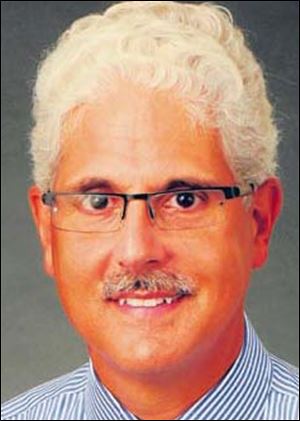
Early detection key to beating colorectal cancer
3/26/2012
Behrle
Colorectal cancer remains a serious health problem in the United States. It’s the third most commonly diagnosed cancer and the second-leading cause of cancer death.
The good news is that through better screening and improved treatments the mortality has dropped and it’s estimated there are approximately 1 million survivors of colorectal cancer, and numbers are growing.
Early detection and prevention are the keys to reducing the number of new cases and deaths from colorectal cancer. Unfortunately, screening rates remain low. In a survey of Americans over 50 conducted by the Centers for Disease Control (CDC), only 41 percent reported having any screening method for colorectal cancer. Only about 50 percent of those who should be getting a colonoscopy are doing so. The American Cancer Society has a goal of 75 percent of adults 50 and older to get screened by 2015.
A survey of 3,357 men and women published in 2010 by the American Journal of Preventative Medicine found the three most common reasons for not getting screening for colorectal cancer were the failure of a health-care professional to recommend testing, a lack of awareness by patients about being screened, and a belief that testing is too costly.
As a practicing gastroenterologist in northwest Ohio for the last 25 years, our primary care providers (family practice, internal medicine, gynecology, physician assistants, and nurse practitioners) have done a very good job of recommending colorectal cancer screening to their patients. Currently, screening colonoscopy is a covered service by Medicare for people 65 and older.
For those of average risk for colorectal cancer once every 10 years is a covered benefit. For those in the high risk category (prior personal history of colon polyps or colon cancer, strong family history of colon cancer or polyps, a known family history of hereditary colorectal cancer syndromes, and a personal history of chronic inflammatory bowel disease), Medicare will cover a colonoscopy every two years. Medicare also covers other screening tests such as the stool blood test, flexible sigmoidoscopy and barium enema with air contrast. CT colonography, also referred to as virtual colonoscopy (a specialized computerized tomography or CT scan of the colon and rectum) is not covered by Medicare as an initial screening test. Discuss with your physician the best screening option for you.
Almost all commercial or private health care insurance companies offer screening colonoscopy as a covered service for clients who are 50, which is the age when colorectal cancer screening should begin. People with a high risk for colon cancer should talk with their doctors about being screened at an earlier age.
Currently 29 states have legislated colorectal cancer screening as a required covered service for commercial and private health insurance companies. Ohio is not a state with this required mandate. Hopefully, future legislation will allow for this in Ohio.
Colorectal cancer screening saves lives in two important ways:
- finding and removing polyps before they become cancerous;
- detecting the cancer early when it is most treatable.
Colorectal cancer screening tests include stool blood test (fecal occult blood test; home collection of stool to detect blood in the stool), flexible sigmoidoscopy (a scope examination of the lower third of the colon), barium enema with air contrast (X-ray examination of the colon done by a radiologist with a chalky substance called barium given as an enema), CT colonography (also called virtual colonoscopy as mentioned above), and colonoscopy.
Colonoscopy allows for a complete examination of the colon and removal of polyps. As numerous studies have demonstrated, removal of precancerous polyps significantly reduces the risk of death from colorectal cancer. When the other screening tests detect blood in the stool, a polyp or other abnormality, colonoscopy is absolutely necessary. Colonoscopy, which requires bowel cleansing before the examination, is done with intravenous sedation to assure comfort during the examination. Unexpected events or complications of colonoscopy are rare, but do occur and might include a risk of missing a lesion, making a tear in the bowel wall called a perforation, bleeding following a polyp removal and a bad reaction to the medication for sedation.
Given the pros and cons of the various screening procedures, colonoscopy is considered the “Gold Standard” of screening tests. Colonoscopy is endorsed by the American Society for Gastrointestinal Endoscopy (ASGE), American College of Gastroenterology (ACG), American Gastroenterologic Association (AGA), American Cancer Society (ACS) and the American College of Obstetricians and Gynecologists (ACOG). These authorities and many physicians recommend colonoscopy as the initial screening method.
Colonoscopy and the other screening tests are widely available in northwest Ohio. Procedures should be performed by board certified gastroenterologists, general and colorectal surgeons, in an Outpatient Surgery Center which has received certification by the Accreditation Association of Ambulatory Health Care (AAAHC) and ASGE Endoscopy Unit Recipient (recognized as an endoscopy unit with standards of excellence in gastrointestinal endoscopy).
Scientists are looking for ways to prevent colon cancer, as well as ways to improve early detection treatments. Certain dietary and lifestyle practices relate to the risk of colorectal cancer. Diets rich in fruits and vegetables, low in animal fat, regular exercise, smoking cessation, and alcohol consumption limited to four or less drinks per week have been shown to reduce the risk of colorectal cancer. This combined with regular screening, ideally with colonoscopy, should keep your risk of developing colorectal cancer to a minimum.
Kevin M. Behrle, M.D., is a Gastroenterologist and Medical Director of Outpatient Surgery at the Toledo Clinic. For more information, go to toledoclinic.com.